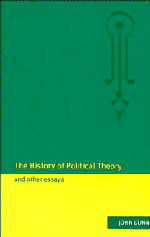Book contents
- Frontmatter
- Contents
- Preface
- Acknowledgements
- 1 Introduction
- 2 The History of Political Theory
- 3 Contractualism
- 4 Political obligation
- 5 Trust
- 6 The claim to freedom of conscience: freedom of speech, freedom of thought, freedom of worship?
- 7 Property justice and common good after socialism
- 8 The dilemma of humanitarian intervention: the executive power of the Law of Nature, after God
- 9 Specifying and understanding racism
- 10 Political science, political theory and policy making in an interdependent world
- 11 Democracy: the politics of making, defending and exemplifying community: Europe 1992
- 12 Is there a contemporary crisis of the nation state?
- 13 Political and economic obstacles to rapid collective learning
- 14 The heritage and future of the European left
- Index
12 - Is there a contemporary crisis of the nation state?
Published online by Cambridge University Press: 05 February 2010
- Frontmatter
- Contents
- Preface
- Acknowledgements
- 1 Introduction
- 2 The History of Political Theory
- 3 Contractualism
- 4 Political obligation
- 5 Trust
- 6 The claim to freedom of conscience: freedom of speech, freedom of thought, freedom of worship?
- 7 Property justice and common good after socialism
- 8 The dilemma of humanitarian intervention: the executive power of the Law of Nature, after God
- 9 Specifying and understanding racism
- 10 Political science, political theory and policy making in an interdependent world
- 11 Democracy: the politics of making, defending and exemplifying community: Europe 1992
- 12 Is there a contemporary crisis of the nation state?
- 13 Political and economic obstacles to rapid collective learning
- 14 The heritage and future of the European left
- Index
Summary
Formulating the question
Nations consist of those who belong together by birth (genetically, lineally, through familially inherited language and culture). States consist of those who are fully subject to their own sovereign legal authority. A true nation state, therefore, would consist only of those who belonged to it by birth and of those who were fully subject to its sovereign legal authority. By this (for practical purposes, no doubt absurdly stipulative) criterion it is unlikely that there is a single nation state in the world at present, and moderately unlikely that any such state has ever existed. But, as with most political ideas, the force of the idea of the nation state has never come principally from its descriptive precision. What it offers is a precarious fusion of two very different modes of thinking: one explicitly subjective, urgent and identificatory, and the other presumptively objective, detached and independent of the vagaries of popular consciousness. (It is hard to exaggerate the shaping impact of this second mode in forming the category of state (Skinner 1989).) Common birth is both a ground for, and a source of, allegiance. External authority is a device for furnishing protection. Taken together, they furnish a basis for rulers and subjects to live together with greater imaginative ease than either party would be likely to draw from the other taken separately: a contemporary version of xhepactum subjectionis (chapter 3 above).
- Type
- Chapter
- Information
- The History of Political Theory and Other Essays , pp. 196 - 210Publisher: Cambridge University PressPrint publication year: 1995



